Leo was probably the biggest dog I have ever seen.
He didn’t start out that way, of course.
The first time my son and I saw Leo, he was a writhing fur ball, a puppy flopping over and cuddling with his nine brothers and sisters. Leo was the most active, biggest, and most playful of the puppies. He would have been the pick of the litter, the breeder said, and groomed for dog shows and breeding like his champion ancestors, if it wasn’t for his crooked tail—pinched and permanently bent in his mother’s crowded womb.
Instead of becoming a show dog and stud, we drove him home to be our pet when he was still tiny enough to rest snugly on my forearm in the car. Leo grew rapidly, however, reaching forty pounds at four months before hitting another growth spurt that left him with a gangly teenage body. He soon grew into his body, weighing 196 pounds as a young adult, before adding even more muscle and thickness to his stocky frame. Strangers and visitors marveled at his size.
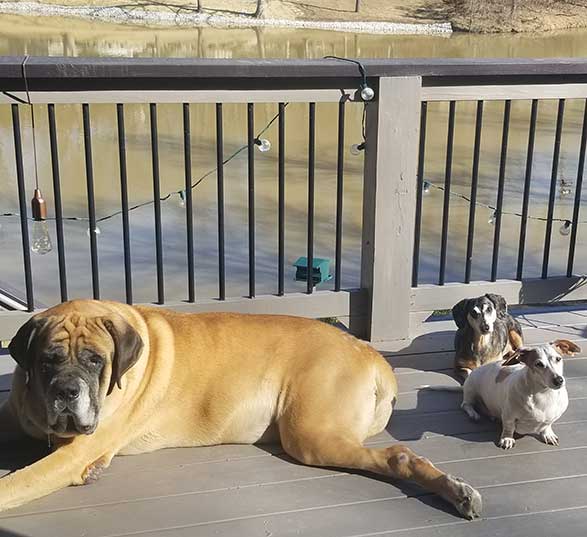
As stunning as Leo’s size was, he was even more remarkable for his personality and spirit. He loved other creatures, human and canine, and was a master at making friends. This was evident from his puppyhood as he won over Rus, another family dog. Rus had remained heart-broken over the death of our family’s first English Mastiff, Maximus, a rescue dog with one-eye and an artificial hip who had died from Wobbler’s Disease six months earlier at the tender age of four-and-a-half.
Max, too, had a sweet and loving spirit, and he and Rus had been constant companions and playmates since they were both six months old. After the new pup Leo took up residence in a gated area in the kitchen, Rus completely ignored him for weeks, taking the long way around the room, hugging the perimeter walls and looking away as he made his way out to the door to the backyard. It was if Rus didn’t want to see this new dog—and he certainly wasn’t going to open his heart to the risk of more loss and pain.
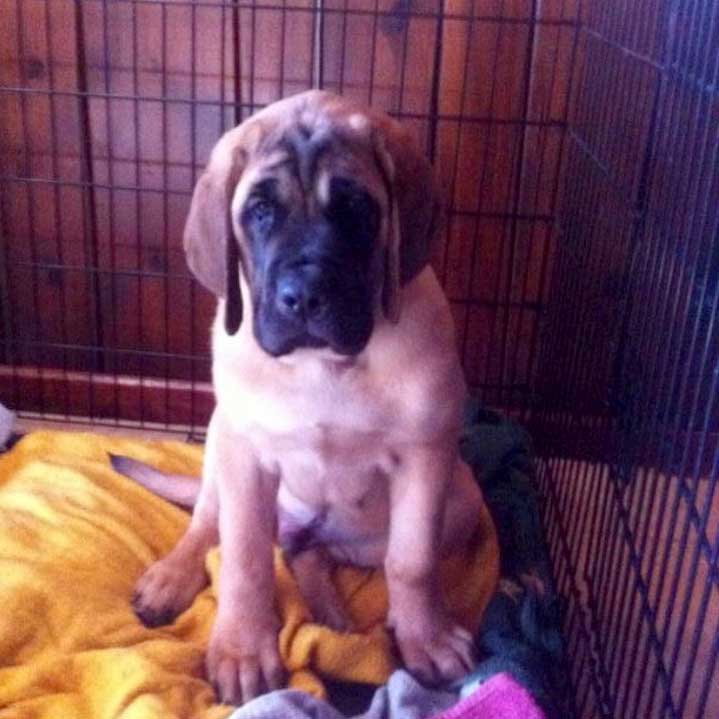
A Playful Spirit
Leo was not easily offended, however, and he continued his relentless attempts to play with Rus, efforts that eventually brought them to be the closest of friends, playmates who frequently romped together in the yard. Leo loved games of chase, wrestling, and stick tug-a-war, or just curling up next to Rus in the house. Leo had a playful spirit and though he loved to play with other dogs and people, he also knew how to have fun himself, rolling on his back, tossing a stuffed animal around, gnawing on a chew bone, and perhaps best of all, rolling in the snow (while wiggling around in fresh snow, he once slid 40 feet down a hill on his back as if he was on a sled, enjoying the ride the whole time). While Rus remained Leo’s best friend, Leo had a generous spirit and he welcomed without jealousy or aggressiveness other dogs who eventually came into his family.
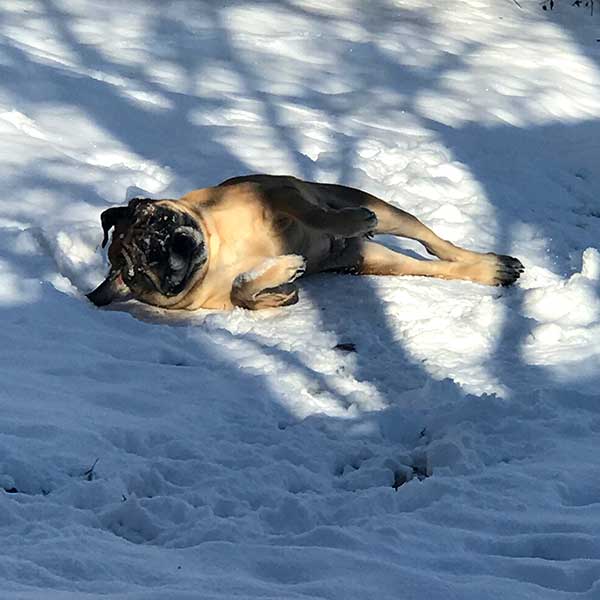
Leo was as engaging of people as he was dogs, though he had to overcome a fear of strangers when he was a young adult, which would sometimes leave him piddling on the floor and running behind me when he first met people, including the veterinarians who came on house calls. As Leo matured, he became friendly toward all visitors, not just relatives and friends. Even saying the name of his vet on the phone triggered his excited barking and looking toward the door.
The first time he met Susan Abbott, a woman I was dating, he knocked her down in enthusiasm, his tail wagging as he kissed her (something he often repeated over time). Perhaps Leo knew before I did that this was the woman I should marry. The positive feelings were mutual, not only for Susan, who loved Leo at first sight, and for his dog sitters and veterinarian helpers, but even for a variety of other people with infrequent contact, such as the delivery man who left him extra biscuits and the repairman who said, after a few visits, “I love that dog.”
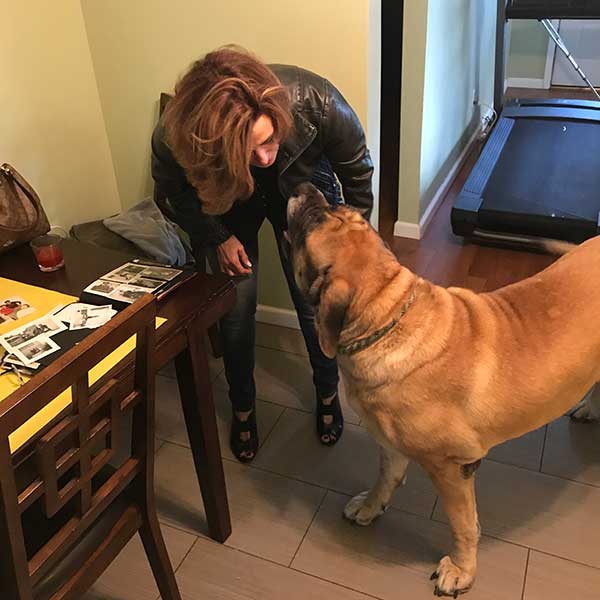
Closest Companion
“Dog is man’s best friend” is a well-worn phrase and one that I was trying not to use, but it is a cliché because it is so often true and this became my reality, too. Leo was my closest companion for seven years. Initially, I was a bit like Rus, my heart guarded as I still grieved Max, a very special dog whom I loved deeply. But Leo worked his way deep into my life and emotions by his presence and personality. Where I would go, Leo would go. He sat next to or behind me thousands of times as I wrote at my table; he lay next to me outside as I meditated; he followed me into the garage when I exercised. And he frequented my pandemic-era Zoom work meetings, shoving his massive head onto my lap and in front of the computer video (I confess moving the computer at times to show him off).
Leo quickly came to recognize the meaning of a suitcase pulled out to pack for a trip. He stayed extra close to me then or sometimes lay on the floor, his nose straight ahead and wedged between his front paws while his eyebrows were furrowed in an expression that I was never sure was resignation or pouting. It was the same posture and look he gave me during the pandemic lockdown when he saw me reaching for a coat and readying to leave the house. However disappointed he might have been when I left, he typically waited at the bottom of the steps leading to the garage (Leo was never one to climb stairs), his head resting on the bottom step before booming raucous barking when we returned and lifting his front paws up to the second or even third step—”two-steepers” and “three-steepers” we called them—to greet us.
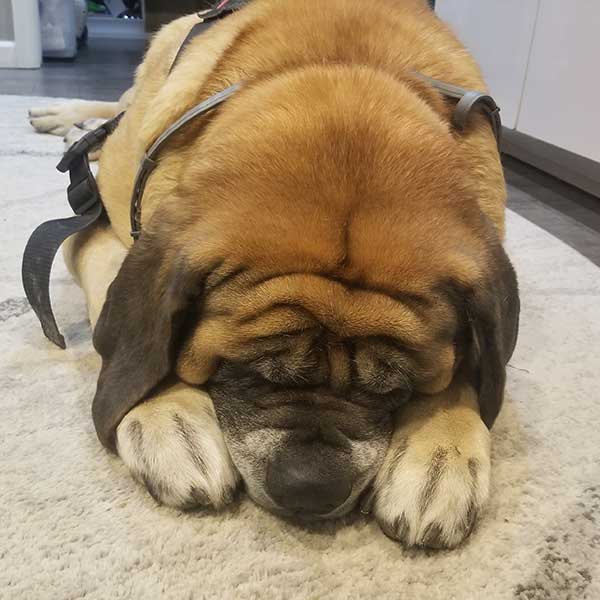
When Leo and I lived alone for four years, I tried to keep him out of my bedroom both because he would shed his tawny fur and, especially, because he slobbered more than any dog I have ever known: drool regularly collected in the massive folds of his lips (think Hercules from Sandlot), dangling in long strands before he shook his head, flinging saliva in all directions, including against walls and even occasionally onto the ceiling.
Still, after Leo needed an emergency surgery for kidney stones blocking his urethra, a condition that nearly claimed his life, he refused at bedtime to go into his crate (he had also outgrown the largest crate that the pet store sold) and found a way to sneak into my bedroom, resisting my attempts to coax, command, or lure him back to his room. He tried to remain quiet and still next to my bed, as if I wouldn’t know the massive 200-pound creature was there.
Not infrequently, he woke me in the middle of the night as we slept, sometimes by his thunderous snoring, sometimes by the thumping of his long and thick (though crooked) tail that pounded the floor during a happy dream, and occasionally by a low, mournful wail, like the siren of a whale. I imagined during those sorrowful cries he was experiencing a sad dream, perhaps involving the loss of his best friend Rus, who was hit and killed by a car when Leo was three.
Over seven years and a few months, Leo was with me for major life transitions: a divorce, four years of being single and living alone again, the death of my last living parent (although I wasn’t crying right then, Leo came up to me as I sat with the news about my mother and pressed his head tight against my leg in a way that he had never done before), remarriage, our move to a blended family with my new wife and her two dachshunds, the shelter-in-place pandemic mandates, and the start of my semi-retirement. With his enormous presence, with his loyal companionship, with his playful and loving spirit, he eased me through each of these major life passages.
In prescient moments, I also dreaded the transition that I knew the years would eventually bring. When Leo was only three, I watched the Spanish film, Truman, about a man dying from cancer as he spent time with his closest friends and tried to find a home for his beloved dog, Truman. “Relationships are everything” the dying man said, and it was clear that the protagonist’s relationship with Truman was as precious as any human friendships. That movie, along with the Hollywood tear-jerker, A Dog’s Purpose, made me both miss Max again and anticipate the eventual loss of Leo, with a sad recognition that life passes quickly and we lose many of those we love dearly.
Microcosms of Our Lives
In the time we have with our pets, we can see the microcosms of our own lives. Dogs demonstrate the rapid cycle of life that we tend to deny: they show us within relatively brief chapters of our own lives the stages of birth, energetic youth, mature adulthood, and the elder years, which are often accompanied by the trials of illness, disability, and dying.
Leo, like other English Mastiffs, was on his own fast journey through life. He was a rambunctious and at times mischievous puppy who grew up quickly, and a strong and determined (though sweet) adult who on our leashed walks dragged me down the street. He aged quickly, however. By four, he was showing signs of osteoarthritis and started on a supplement and an anti-inflammatory drug to help his joint pain and mobility. The next year, he was also prescribed gabapentin to help control the pain and improve mobility.
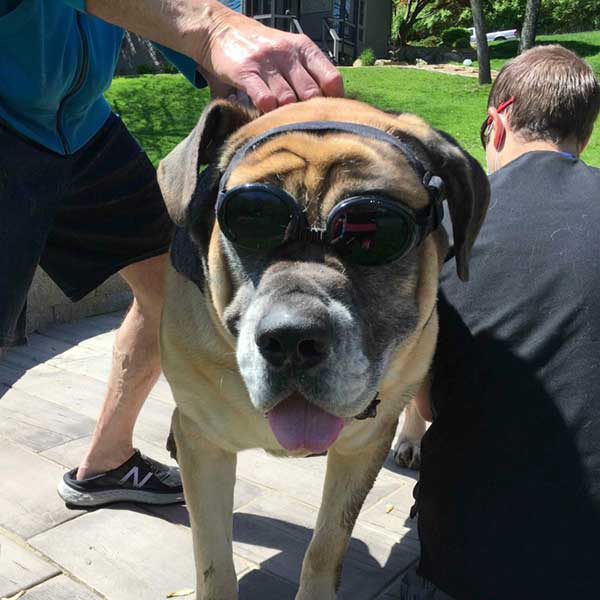
Although these treatments helped, his mobility worsened markedly by the Spring of 2020, as he had trouble getting up from the floor and walking; he often fell attempting to traverse a wood floor or a grassy slope. His medications were increased but he still had difficulty moving. I searched for acupuncture for dogs, which is effective for canine osteoarthritis and pain, but was unable to find a provider during the pandemic lockdown. His existing vet offered in-home laser light therapy, also effective for arthritis and pain, and we soon started Leo on a weekly regimen. Although he was initially uncomfortable with the treatment, especially wearing sunglasses for protection from the laser light (his head was so gigantic that the vet had to fashion horse goggles around his bulbous noggin), he soon looked forward to the vet visits, with their additional human connection and petting.
The laser treatment initially provided a significant boost to his mobility and he again enjoyed walks up the long, hilly driveway into the neighborhood. By mid-summer, however, his difficulty standing up and walking returned, and, again, he often fell. Still, Leo remained incredibly stoic and resilient, never crying or whining, despite often crashing his huge body onto a hard surface. We outfitted Leo with a shoulder harness and a customized red chest-and-back vest with straps that allowed us to help lift him off the floor and navigate his walking with fewer slips. His territory narrowed from neighborhood street walks to the backyard, though he enjoyed daily trips with us to the gazebo (barking with glee at the question, “Who wants to go to the ‘Zebo?”) and along the small lake that bordered the house. Despite the limited range, he remained happy, savoring the sun, the company, and the petting while lying on the gazebo floor. He even seemed to smile proudly when he waddled in an uneven trot in his big red vest along the lake with the rest of his family (including the two dachshunds and a boxer mix who joined the pack during the pandemic). I worried we might lose Leo in August 2020 after he developed an infection in a large open sore on his elbow. This wound never fully healed, despite multiple rounds of antibiotics, but he remained in good spirits, enjoying his life and activities, which included backyard walks, playing with small stuffed animals, greeting visitors, and lying next to his canine and human pack members.
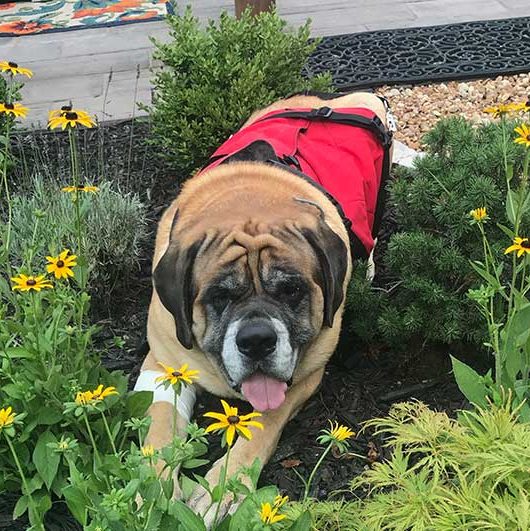
In early December, we woke to terrible crying resonating from the downstairs living room. Leo, unable to roll off of his side, cried out in pain and probably fear and frustration. Eventually, we were able to roll him over, and later, to lift him and assist him outside. His vet thought he had hurt his back and his hip and knee osteoarthritis had become very severe. He was also anemic and soon diagnosed with spleen cancer. Before long, he turned his big black nose away from food, even hot dogs and peanut butter, which were his favorites. His vet did not believe Leo would live to Christmas and discussed euthanasia.
Resilience in Battling Disease
If anything, however, Leo was resilient. Titrating his medications and supplements also helped and so did adding a new injectable medication to help treat his osteoarthritis. This medicine gave Leo (he was so big, his vet had to order a vial dose for a horse) a significant boost: within an hour of the first shot, he was even able to get up twice on his own without assistance. Although he was weaker and had some bad as well as better days, we celebrated Christmas together (for the first time in weeks, he polished off his dinner: kibble mixed with holiday turkey and slathered with pan drippings), New Years, Valentine’s Day, and then Leo’s favorite, a heavy February snowfall. For a few moments each day, the snow seemed to bring Leo back to a more energetic time in life, as he rolled in the snow and ate at every opportunity the frozen precipitation like a snow cone.
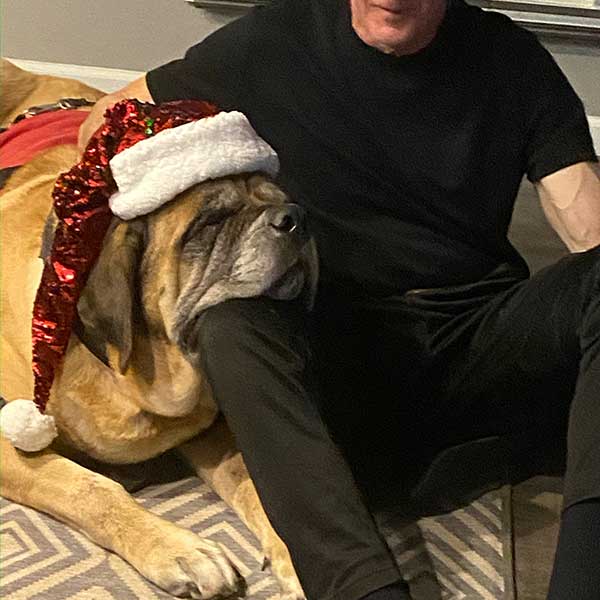
Over time, the medications (he was on up to 25 pills daily, along with the injectable and weekly laser light therapies) became less effective, his mobility worsened. It now took both Susan and I lifting simultaneously—and often multiple attempts—to raise him from the floor and help him walk. Still, Leo would sometimes suddenly fall, occasionally bringing us down to the floor with him. And his cancerous tumor grew.
He sometimes refused food, even when hand fed (something we had been doing for months to help him eat) and with a new medication to stimulate his appetite. He whined more, restless and uncomfortable; at other times, he loved to simply be close, whether it was lying next to me at my work area, resting his big head against the legs of the dinner table, or just settling in with the rest of the family around the television at night. At moments, despite his pain and growing discomfort, and especially when he was being scratched under the chin (his favorite spot) or when he propped his massive head against my leg or the sofa, his eyes shone with peace, joy, and love.
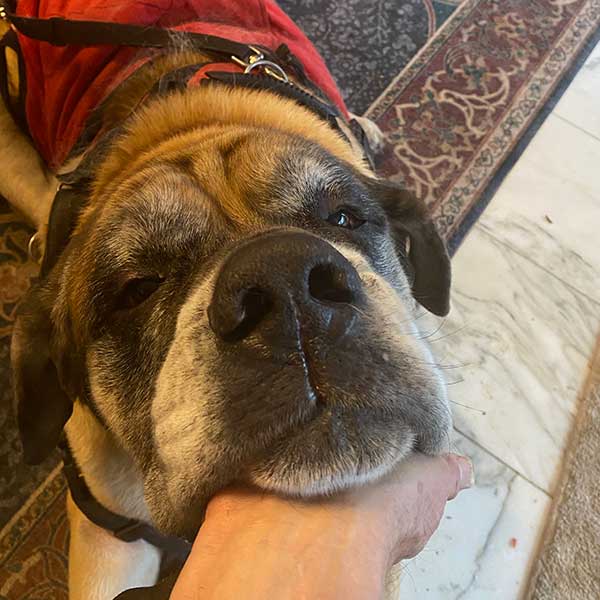
On March 19, 2021, his palpable tumor had grown to gigantic proportions, swelling his abdomen. His vet believed the cancer had metastasized, probably at least to the lungs. He needed to stop every ten feet or so to catch his breath and muster energy as we helped him out the front door, where he collapsed onto the concrete, panting heavily. That afternoon and evening he cried and moaned for hours in pain, even on the exhale of his breath as he slept.
An Agonizing Choice
The most difficult part of having a pet is having to make the decision whether and when to euthanize a sick and dying loved one. I have had to do so seven times over the course of my life (often having two to four dogs at a time), but it was no easier with Leo. I dreaded the possibility for months, even as I prayed for his health and hoped that when it was his time, he would die peacefully in his sleep.
As Leo’s condition worsened over the months, I talked with the vet, read articles online, and understood that euthanizing an animal that is dying and suffering is an act of kindness—and yet it is still an agonizing decision. I loved Leo deeply, as millions of other people also love their pets, and it is a heavy and sad responsibility to make the decision to end the life of another being. Important questions surface, and they are questions that often seem unanswerable: Is it the right time? Is the pet really suffering or just temporarily uncomfortable? Will the pet improve again and have more good days ahead or deteriorate into agonizing pain?
Fortunately, we are confronted far less often with similar situations about our human family members, and in these difficult times, we are usually guided by the person’s living will or verbalized wishes. With our pets, we only have our own sense of what they need by their behavior (symptoms, incapacitation, crying, refusal to eat) and sometimes by the look in their eyes. In Leo’s eyes, I perceived over the last couple of days not only his gentle and loving spirit, but pain, fatigue, and, most importantly, a wish to be let go.
We were able to enjoy a final weekend that Susan designated as a celebration of life for Leo: an extended family get-together, barbeques with steak and hamburgers and hot dogs, cake and ice cream, and hours of sitting and petting and talking with Leo, who was in less pain though very weak. These were precious moments—and they, like his life as a whole, passed too quickly.
Then, as it will be eventually for all of our pets, as it will be someday for all of us, Leo’s life came to an end.
Existential Facts
His dying was a very sad event in the family, and one that also illuminates troublesome facts that life presents to every person:
Most of us will age, get sick, lose functioning abilities.
We will eventually lose others whom we cherish and love, even while wishing for more time and experiences together.
And, sooner or later, all of us will die.
Fundamental Questions
These are the non-negotiable facts of living, the price of admission to being born. Their inevitability also raises fundamental questions:
How do we deal with loss and grief?
What, if anything, happens after our physical body dies?
How do we best live, knowing that we and all those we hold dear are impermanent in this life?
These are essential questions of existence that humankind has considered for eons. There is no shortage of beliefs about these matters, some by the wisest sages of time. Leo’s life and his loss also offer valuable lessons.
Grief is complicated and multifaceted. Its course is often uneven. Sometimes, there is an initial shock but in other situations, as for me with Leo, there was immediate and intense sadness, the kind that hurts deep in your gut. Leo’s presence was unmistakable: the sight of his huge body sprawling on the floor, his soft tawny fur under a petting hand, his big brown eyes pouring out happiness and love, his loud barking filling the house when he was excited. (Outside, he often had barking battles with a dog across the lake. Leo’s barking was so loud that it resonated across the water—and then Leo would bark again his own echo). Where Leo was, there was now his absence.
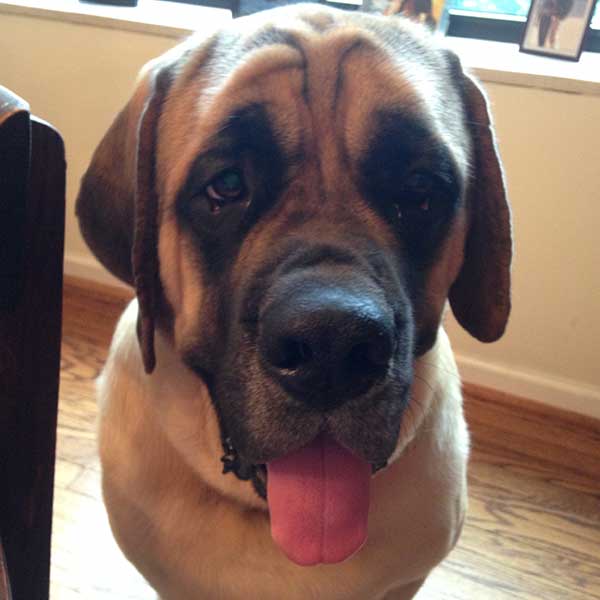
A few days after his passing, I felt numbness growing in the emotional void of my heart where Leo had been.
Coping with Grief
Over the decades of my life, I have learned it is far better to accept feelings, even sadness and grief, than to seal over in numbness, which can soon spawn depression and other problems.
It is difficult, but one needs to feel the sadness of loss as the price of admission for love. Otherwise, we risk more troubling emotional and behavioral consequences, including closing our hearts.
While we must allow ourselves to accept our feelings, there is also the challenge of not becoming lost in grief—a risk which I have seen others fall victim to, and a possibility I have witnessed in myself. Sometimes, we can miss another so much that we overly attach to the lost loved one. At such times, we are grieving more a part of ourselves—a part of the ego that has become cathected and over-identified with the beloved other—than the lost person or pet.
I saw in my grief over Leo (a lesson I have had to learn repeatedly over time and across multiple relationships and losses), that no matter how much we love, no matter how much another means to us, we are separate from the other.
And yet—and here is the rub—we are also interconnected.
Love, and perhaps consciousness, bridges the gap between us and the cherished other. The truth then is a paradox: we can simultaneously feel a connection and a separateness. The matter is not simply a philosophical one, but a way of being that allows us to respect and love the other, to feel close and connected, to glimpse the greater interconnection of being, and to remain separate and healthy, even amid sadness and loss.
Mystery of Death
Perhaps our losses are not forever, anyway. What, if anything, happens to us after death is a mystery. Still, most of us have our opinions, and many, especially scientists, hold that death brings an end to our existence and consciousness. My own experience suggests otherwise, and Leo again provides an example.
On his last night alive in his body, Susan and I watched on Netflix the final episode of the documentary Surviving Death. After the program, which spent considerable time documenting after death communications, Susan turned to Leo who lay at our feet and told him, “I want a sign.”
The next evening, after Leo’s passing, Susan and I were sitting at the kitchen counter, and she said, “Stop licking me, Mia!” (Mia is one of her dachshunds.) I saw Mia and the other two dogs were lying six feet away from Susan and none had moved. When I explained this to Susan, she said she had just very clearly felt the licking of a dog’s tongue against the back of her ankle. Susan’s interpretation, and mine, was that Leo was providing her with a sign, as she had asked.
Life after death cannot be proved beyond doubt by this event, of course. But Susan’s experience is similar to other personal experiences that I have had. After the specialist at the university veterinarian school told me in 2013 that Max only had a few weeks to live, after I had been thinking about the possibility of his being euthanized when his condition worsened, I thought about Max while I prayed and meditated, wondering then what happens after death. I opened my eyes then and looked at Max, lying on the floor but he had already raised his head and was looking at me with a sparkle in his one eye and some other indescribable expression on his face—a look that conveyed a spiritual connection and gave me the strong sense that he was letting me know his spirit was going to live on and our relationship was going to continue, too.
A few weeks later, after the vet had euthanized a very sick and disabled Max, I heard three faint yipes—the kind of high-pitched barks that Max used to emit—as I got out of the shower. The next morning, I smelled Max’s scent for a few seconds; one other time I again heard the three yips of his distinctive bark.
I have had somewhat similar experiences with deceased family members on a handful of occasions over the years, especially involving a sudden and overwhelming sense of the presence of someone I deeply loved and had lost: my father, my mother, and my grandmother. I have not had the same kind of experience with Leo since his death, but two days later, after waking and during meditation and prayer, I felt a powerful sense of both connection and love with Leo and with God, an experience that was as peaceful as it was positive. Perhaps that was Leo’s way of letting me know he is okay and with God?
Of course, these kinds of experiences are not unique to my family. Multiple studies have found near-death experiences and after-death communications are common, though typically relegated to the shadows of our culture.
Often, we doubt our experiences: they do not seem realistic, at least as we have come to think of reality. Or we think they are misperceptions created by our wishful thinking. Even when the experiences seem clear and unmistakable, people are often reluctant to share them for fear that others will think they are imagining things or, worse yet, losing their sanity out of grief.
After-death experiences prove nothing that cannot be doubted.
Still, my guess, given these events, other spiritual experiences, and faith, is that Leo’s and Max’s souls, like ours, continue beyond death.
What happens after death will remain a matter of debate.
Lessons from Leo
What we know for sure is that we have choices on how to live now. The possibilities of how we can act are vast, but Leo’s life provides guidance on some of the best ways to live. In particular, we can:
Be big-hearted.
Enjoy life, including the simple things, every day.
Be fully present, especially with those we love.
Be a loyal friend and companion, joyful at the sight of those in our lives.
Be cheerful and happy each day.
Most of all, accept and love those in our lives, even when we are not feeling our best.
We can also know that even when death takes away those closest to us, we still have the choice to hold them in our hearts in love.
And so, one year later, in a way that comes easily, I hold Leo close in my heart each day.
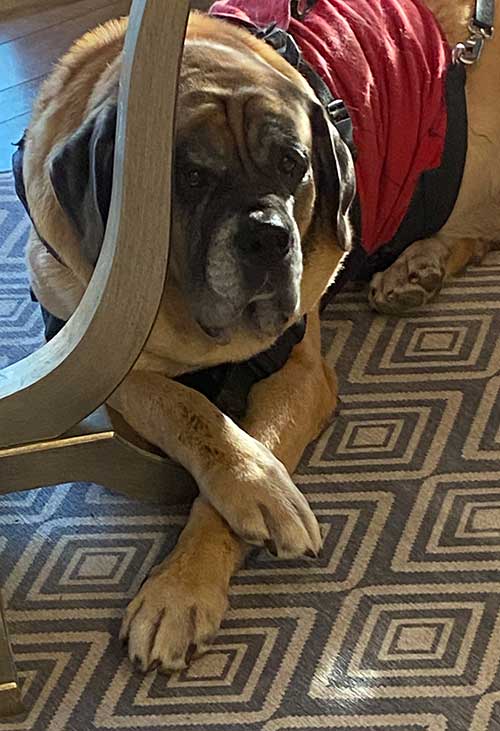

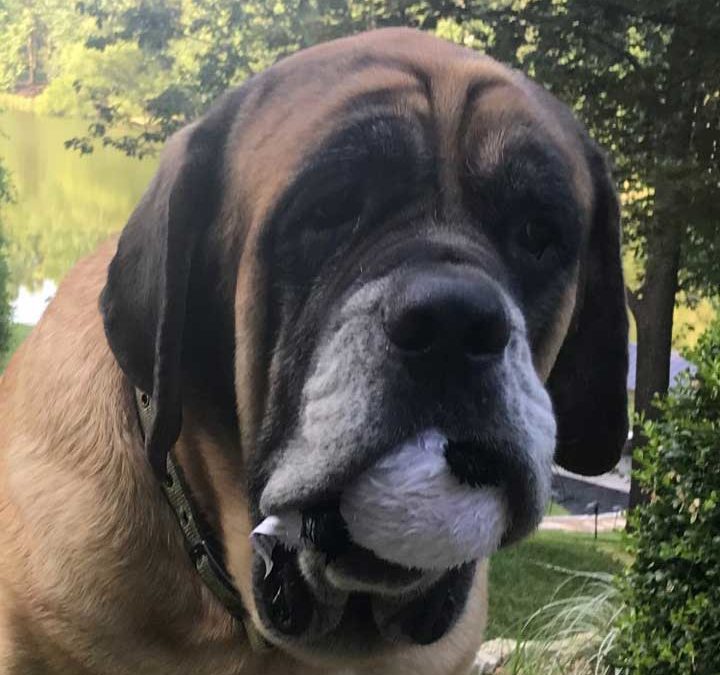
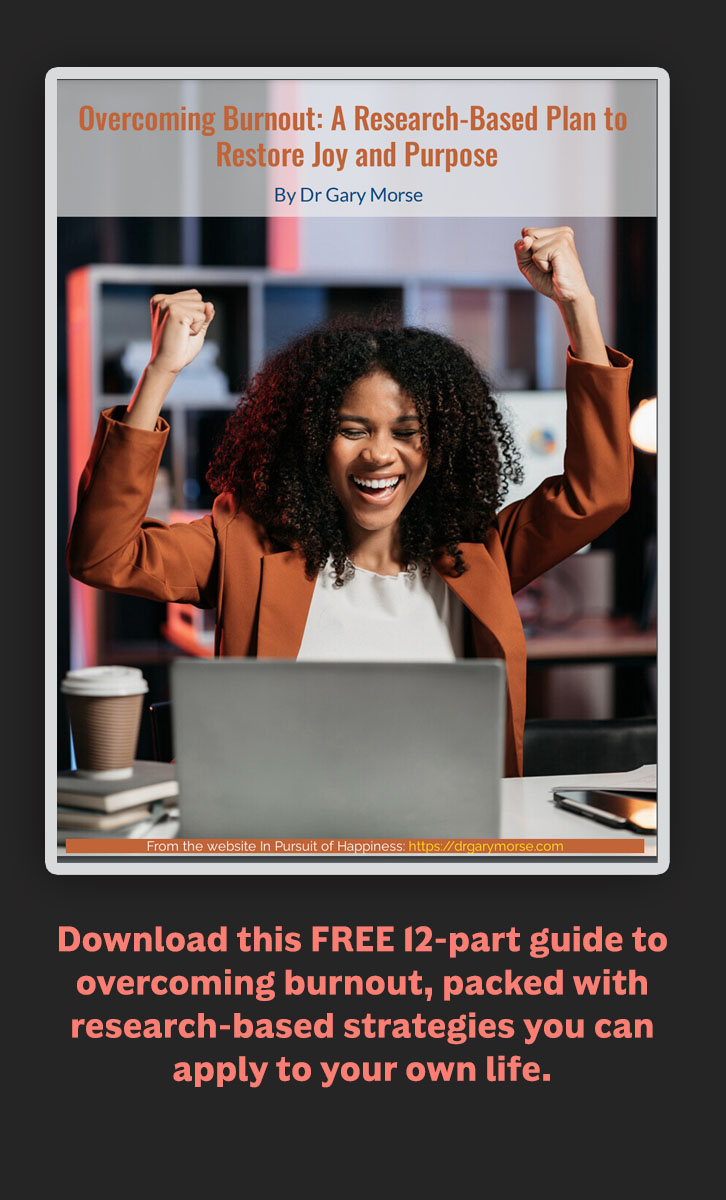
I can’t even begin to explain how much reading this touched my heart. From learning things I didn’t know about Leo before I met him, to your deepest feelings after he passed and the signs. Oh, the signs. I can relate to the unconditional love of pets, and the missing pieces of our hearts when it’s time for them to go. There is no pain quite like it.
I read through tears Leo’s story, in agreement to his BIG heart to go along with his BIG body. Each and every visit to see him, Mia, Charlie & Pudge, it was evident to me by the soulful looks I received, that Leo saw straight through to my heart.
My helper Lisa expressed to me the same feelings about Leo and admitted she loved him relentlessly.
Gary, I love your writing. While reading this I was able to re-live all my times with Leo & the gang and I needed that. I think of them (and you & Susan!) often since you moved from St. Louis.
Thank you for this memory of Leo. The part of my heart that has been numb feels revived. I don’t know if the link will work if I attach it here, but I am adding the video I made after Leo passed. He lives on in my heart, but the video helps me to remember why he was so special to all of us.
https://youtu.be/gNj1fXQ6BYY
Thank you, Donna, for your thoughtful and kind comment. And for sharing your wonderful YouTube video. Even more, thank you for the love and care you provided to Leo and his pack–and for your openness to see beyond his slobbery, furry self and other things that can separate us to his loving heart and soulful looks that can connect us all.
‘What a wonderful article Gary!!! As you know, Leo and I were tight…..lol. He was the biggest dog I have had the pleasure to go nose to nose with after “Hello, it’s nice to meet you.”
He made me feel welcome and trusted and frankly a bit better about the new person in Susan’s life. Any man that would have, take care of and love such an enormous dog had to have the make up to do the same for my Susan.
If we could all make the choice to be more like Leo and show that kind of acceptance to each other, the world might feel like a musical compared to what it does right now.
Everyone should have a Leo!!!! Thank you for sharing :o)